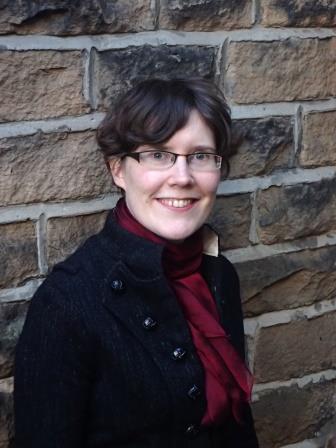Dr Daisy Black, Faculty of Arts

Daisy is a Lecturer in English Literature, and specializes in late medieval drama. After studying English at the University of Cambridge, she went on to complete her MA and PhD at the University of Manchester in 2014. Her thesis charted character conflicts in religious plays concerned with transition or rupture. This work stimulated an ongoing interest in medieval understandings of time, including gendered and queer time; periodization; experiences of time during religious or political transition; concepts of authority and origin; Jewish-Christian tensions and dramatic performance as a means of reassessing lay theologies during the early Reformation. She is currently writing a book on time and gender in medieval religious drama.
Other research interests include the performance of food in medieval drama; medieval antisemitism; theories of spectatorship; women on the medieval stage; women at sea and medievalism in modern board game cultures.
Daisy is one of the 2018 AHRC / BBC New Generation Thinkers. As a theatre practitioner and storyteller, she has produced creative work for bodies as diverse as the Royal College of Physicians and Manchester Cathedral. Current projects include storytelling performances of the Bayeux Tapestry; Broken Shells (a refugee story based on Chaucer’s Man of Law’s Tale) and Unruly Woman – a collection of medieval stories about women defying the restrictions placed on them by their class and gender.
Play Time: Temporality, Gender and Conflict in Medieval Religious Drama
I will be spending the first half of my ERAS time writing my monograph, Play Time: Temporality, Gender and Conflict in Medieval Religious Drama. This examines the diverse ways of performing and experiencing and gendering experiences of time in late medieval drama.
Medieval civic plays brought chief episodes from the Hebrew and Christian bibles into long performances. Yet relationships between the medieval ‘presents’ of their staging contexts and these biblical ‘pasts’ were rarely smooth, with tensions manifesting in arguments, laughter and violence between bible figures. Conflict generated by characters such as Herod, Joseph and Noah’s wife has conventionally been analysed as unruly, comic, or sinful. This book argues instead that these conflicts constitute thoughtful negotiations of narratives establishing moments of transition or fissure (such as the Incarnation, Flood, or Crucifixion). Engaging with questions of spectatorship and recent works in gender and Jewish studies concerning Christian preoccupations with superseded, yet ‘present’ pasts, it interrogates how these models are subverted when character worldviews support alternative readings of their time.
The second part of my project involves the performance of a new adaptation of a medieval play in Wolverhampton. Students will be involved at all levels of the adaptation and performance, which will be performed in the city as well as appearing online. My monograph research will also be disseminated through my storytelling work, including performances of Unruly Woman; a story show which grew out of this research. As a New Generation Thinker, I will also produce radio broadcasts, news and blog articles on this project.


/prod01/wlvacuk/media/departments/digital-content-and-communications/images-18-19/iStock-163641275.jpg)
/prod01/wlvacuk/media/departments/digital-content-and-communications/images-2024/250630-SciFest-1-group-photo-resized-800x450.png)
/prod01/wlvacuk/media/departments/digital-content-and-communications/images-18-19/210818-Iza-and-Mattia-Resized.jpg)
/prod01/wlvacuk/media/departments/digital-content-and-communications/images/Maria-Serria-(teaser-image).jpg)
/prod01/wlvacuk/media/departments/digital-content-and-communications/images-2024/241014-Cyber4ME-Project-Resized.jpg)
/prod01/wlvacuk/media/departments/digital-content-and-communications/images-18-19/210705-bric_LAND_ATTIC_v2_resized.jpg)